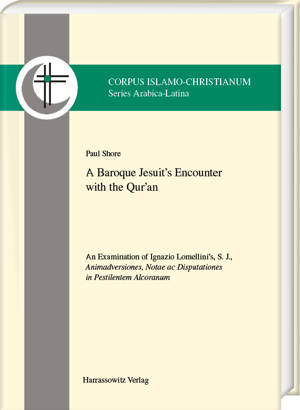
Door een staking bij bpost kan je online bestelling op dit moment iets langer onderweg zijn dan voorzien. Dringend iets nodig? Onze winkels ontvangen jou met open armen!
- Afhalen na 1 uur in een winkel met voorraad
- Gratis thuislevering in België vanaf € 30
- Ruim aanbod met 7 miljoen producten
Door een staking bij bpost kan je online bestelling op dit moment iets langer onderweg zijn dan voorzien. Dringend iets nodig? Onze winkels ontvangen jou met open armen!
- Afhalen na 1 uur in een winkel met voorraad
- Gratis thuislevering in België vanaf € 30
- Ruim aanbod met 7 miljoen producten
Zoeken
Omschrijving
Very little is known about the origins of Animadversiones, Notae ac Disputationes in Pestilentem Alcoranum, a manuscript of 323 two-sided folios composed by the Jesuit Ignazio Lomellini (born around 1560 in Genoa, died 1645 in Rome), housed in the library of the University of Genoa (Ms A-IV-4) and bearing the date 1622. This document is a unique surviving exemplar of the oldest translation of the Qur'an into a Western European language to include the complete Arabic text. Moreover, it contains a detailed commentary consisting generally of attempts by the author to refute or discredit the Qur'an and the Prophet Mohammed as well as numerous marginalia. The significance of this work derives both from its early place among transcriptions, translations and commentaries of the entire Qur'an undertaken by Western Christians and because of the high quality of the translation itself. The work is also a unique window into the training and attitudes of Jesuit missionaries and writers engaging with Islam during the early modern period, and thus sheds light on subsequent representations of Muslims and Islam in Jesuit homiletics, drama, and visual art. The book contains a thorough discussion of Lomellini's principles of translation, his coping with problematic Arabic passages and words, and the manifold sources on which the author relied. In addition, and as an example for Lomellini's translation technique, an analysis and a full transcription of the Latin text of Sura 18 ("The Cave") is provided.
Specificaties
Betrokkenen
- Auteur(s):
- Uitgeverij:
Inhoud
- Aantal bladzijden:
- 206
- Taal:
- Engels
- Reeks:
- Reeksnummer:
- nr. 3
Eigenschappen
- Productcode (EAN):
- 9783447120449
- Verschijningsdatum:
- 9/08/2023
- Uitvoering:
- Hardcover
- Formaat:
- Genaaid
- Afmetingen:
- 220 mm x 20 mm
- Gewicht:
- 911 g

Alleen bij Standaard Boekhandel
+ 114 punten op je klantenkaart van Standaard Boekhandel
Beoordelingen
We publiceren alleen reviews die voldoen aan de voorwaarden voor reviews. Bekijk onze voorwaarden voor reviews.











